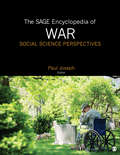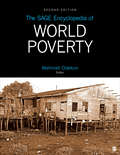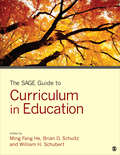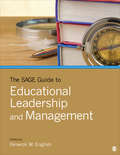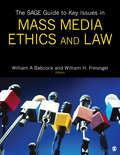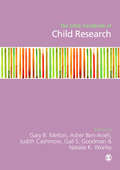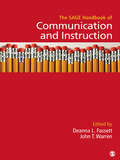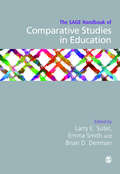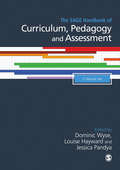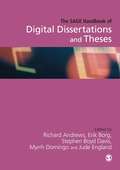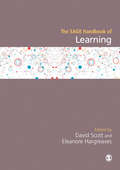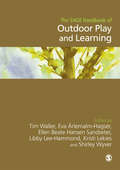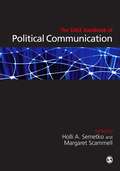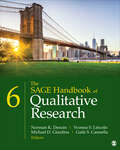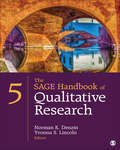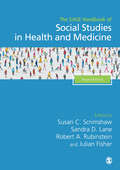- Table View
- List View
The SAGE Encyclopedia of War: Social Science Perspectives
by Paul JosephTraditional explorations of war look through the lens of history and military science, focusing on big events, big battles, and big generals. By contrast, The SAGE Encyclopedia of War: Social Science Perspective views war through the lens of the social sciences, looking at the causes, processes and effects of war and drawing from a vast group of fields such as communication and mass media, economics, political science and law, psychology and sociology. Key features include: More than 650 entries organized in an A-to-Z format, authored and signed by key academics in the field Entries conclude with cross-references and further readings, aiding the researcher further in their research journeys An alternative Reader’s Guide table of contents groups articles by disciplinary areas and by broad themes A helpful Resource Guide directing researchers to classic books, journals and electronic resources for more in-depth study This important and distinctive work will be a key reference for all researchers in the fields of political science, international relations and sociology.
The SAGE Encyclopedia of World Poverty
by Mehmet A. OdekonThe SAGE Encyclopedia of World Poverty, Second Edition addresses the persistence of poverty across the globe while updating and expanding the landmark work, Encyclopedia of World Poverty, originally published in 2006 prior to the economic calamities of 2008. For instance, while continued high rates of income inequality might be unsurprising in developing countries such as Mexico, the Organization of Economic Co-operation and Development (OECD) reported in May 2013 even countries with historically low levels of income inequality have experienced significant increases over the past decade, including Denmark, Sweden, and Germany. The U.N. and the World Bank also emphasize the persistent nature of the problem. It is not all bad news. In March 2013, the Guardian newspaper reported, “Some of the poorest people in the world are becoming significantly less poor, according to a groundbreaking academic study which has taken a new approach to measuring deprivation. The report, by Oxford University’s poverty and human development initiative, predicts that countries among the most impoverished in the world could see acute poverty eradicated within 20 years if they continue at present rates.” On the other hand, the U.N. says environmental threats from climate change could push billions more into extreme poverty in coming decades. All of these points lead to the need for a revised, updated, and expanded edition of the Encyclopedia of World Poverty. Key Features: 775 evaluated and updated and 175 entirely new entries New Reader’s Guide categories Signed articles, with cross-references Further Readings will be accompanied by pedagogical elements Updated Chronology, Resource Guide, Glossary, and thorough new Index The SAGE Encyclopedia of World Poverty, Second Edition is a dependable source for students and researchers who are researching world poverty, making it a must-have reference for all academic libraries.
The SAGE Encyclopedia of World Poverty
by Mehmet A. OdekonThe SAGE Encyclopedia of World Poverty, Second Edition addresses the persistence of poverty across the globe while updating and expanding the landmark work, Encyclopedia of World Poverty, originally published in 2006 prior to the economic calamities of 2008. For instance, while continued high rates of income inequality might be unsurprising in developing countries such as Mexico, the Organization of Economic Co-operation and Development (OECD) reported in May 2013 even countries with historically low levels of income inequality have experienced significant increases over the past decade, including Denmark, Sweden, and Germany. The U.N. and the World Bank also emphasize the persistent nature of the problem. It is not all bad news. In March 2013, the Guardian newspaper reported, “Some of the poorest people in the world are becoming significantly less poor, according to a groundbreaking academic study which has taken a new approach to measuring deprivation. The report, by Oxford University’s poverty and human development initiative, predicts that countries among the most impoverished in the world could see acute poverty eradicated within 20 years if they continue at present rates.” On the other hand, the U.N. says environmental threats from climate change could push billions more into extreme poverty in coming decades. All of these points lead to the need for a revised, updated, and expanded edition of the Encyclopedia of World Poverty. Key Features: 775 evaluated and updated and 175 entirely new entries New Reader’s Guide categories Signed articles, with cross-references Further Readings will be accompanied by pedagogical elements Updated Chronology, Resource Guide, Glossary, and thorough new Index The SAGE Encyclopedia of World Poverty, Second Edition is a dependable source for students and researchers who are researching world poverty, making it a must-have reference for all academic libraries.
The SAGE Guide to Curriculum in Education
by Dr Ming Fang He Dr Brian D. Schultz Dr William H. SchubertThe SAGE Guide to Curriculum in Education integrates, summarizes, and explains, in highly accessible form, foundational knowledge and information about the field of curriculum with brief, simply written overviews for people outside of or new to the field of education. This Guide supports study, research, and instruction, with content that permits quick access to basic information, accompanied by references to more in-depth presentations in other published sources. This Guide lies between the sophistication of a handbook and the brevity of an encyclopedia. It addresses the ties between and controversies over public debate, policy making, university scholarship, and school practice. While tracing complex traditions, trajectories, and evolutions of curriculum scholarship, the Guide illuminates how curriculum ideas, issues, perspectives, and possibilities can be translated into public debate, school practice, policy making, and life of the general public focusing on the aims of education for a better human condition. 55 topical chapters are organized into four parts: Subject Matter as Curriculum, Teachers as Curriculum, Students as Curriculum, and Milieu as Curriculum based upon the conceptualization of curriculum commonplaces by Joseph J. Schwab: subject matter, teachers, learners, and milieu. The Guide highlights and explicates how the four commonplaces are interdependent and interconnected in the decision-making processes that involve local and state school boards and government agencies, educational institutions, and curriculum stakeholders at all levels that address the central curriculum questions: What is worthwhile? What is worth knowing, needing, experiencing, doing, being, becoming, overcoming, sharing, contributing, wondering, and imagining? The Guide benefits undergraduate and graduate students, curriculum professors, teachers, teacher educators, parents, educational leaders, policy makers, media writers, public intellectuals, and other educational workers. Key Features: Each chapter inspires readers to understand why the particular topic is a cutting edge curriculum topic; what are the pressing issues and contemporary concerns about the topic; what historical, social, political, economic, geographical, cultural, linguistic, ecological, etc. contexts surrounding the topic area; how the topic, relevant practical and policy ramifications, and contextual embodiment can be understood by theoretical perspectives; and how forms of inquiry and modes of representation or expression in the topic area are crucial to develop understanding for and make impact on practice, policy, context, and theory. Further readings and resources are provided for readers to explore topics in more details.
The SAGE Guide to Curriculum in Education
by Dr Ming Fang He Dr Brian D. Schultz Dr William H. SchubertThe SAGE Guide to Curriculum in Education integrates, summarizes, and explains, in highly accessible form, foundational knowledge and information about the field of curriculum with brief, simply written overviews for people outside of or new to the field of education. This Guide supports study, research, and instruction, with content that permits quick access to basic information, accompanied by references to more in-depth presentations in other published sources. This Guide lies between the sophistication of a handbook and the brevity of an encyclopedia. It addresses the ties between and controversies over public debate, policy making, university scholarship, and school practice. While tracing complex traditions, trajectories, and evolutions of curriculum scholarship, the Guide illuminates how curriculum ideas, issues, perspectives, and possibilities can be translated into public debate, school practice, policy making, and life of the general public focusing on the aims of education for a better human condition. 55 topical chapters are organized into four parts: Subject Matter as Curriculum, Teachers as Curriculum, Students as Curriculum, and Milieu as Curriculum based upon the conceptualization of curriculum commonplaces by Joseph J. Schwab: subject matter, teachers, learners, and milieu. The Guide highlights and explicates how the four commonplaces are interdependent and interconnected in the decision-making processes that involve local and state school boards and government agencies, educational institutions, and curriculum stakeholders at all levels that address the central curriculum questions: What is worthwhile? What is worth knowing, needing, experiencing, doing, being, becoming, overcoming, sharing, contributing, wondering, and imagining? The Guide benefits undergraduate and graduate students, curriculum professors, teachers, teacher educators, parents, educational leaders, policy makers, media writers, public intellectuals, and other educational workers. Key Features: Each chapter inspires readers to understand why the particular topic is a cutting edge curriculum topic; what are the pressing issues and contemporary concerns about the topic; what historical, social, political, economic, geographical, cultural, linguistic, ecological, etc. contexts surrounding the topic area; how the topic, relevant practical and policy ramifications, and contextual embodiment can be understood by theoretical perspectives; and how forms of inquiry and modes of representation or expression in the topic area are crucial to develop understanding for and make impact on practice, policy, context, and theory. Further readings and resources are provided for readers to explore topics in more details.
The SAGE Guide to Educational Leadership and Management
by Dr Fenwick W. EnglishThe SAGE Guide to Educational Leadership and Management allows readers to gain knowledge of educational management in practice while providing insights into challenges facing educational leaders and the strategies, skills, and techniques needed to enhance administrative performance. This guide emphasizes the important skills that effective leaders must develop and refine, including communication, developing teams, coaching and motivating, and managing time and priorities. While being brief, simply written, and a highly practical overview for individuals who are new to this field, this reference guide will combine practice and research, indicate current issues and directions, and choices that need to be made. Features & Benefits: 30 brief, signed chapters are organized in 10 thematic parts in one volume available in a choice of electronic or print formats designed to enable quick access to basic information. Selective boxes enrich and support the narrative chapters with case examples of effective leadership in action. Chapters conclude with bibliographic endnotes and references to further readings to guide students to more in-depth presentations in other published sources. Back matter includes an annotated listing of organizations, associations, and journals focused on educational leadership and administration and a detailed index. This reference guide will serve as a vital source of knowledge to any students pursuing an education degree as well as for individuals interested in the subject matter that do not have a strong foundation of the topic.
The SAGE Guide to Educational Leadership and Management
by Dr Fenwick W. EnglishThe SAGE Guide to Educational Leadership and Management allows readers to gain knowledge of educational management in practice while providing insights into challenges facing educational leaders and the strategies, skills, and techniques needed to enhance administrative performance. This guide emphasizes the important skills that effective leaders must develop and refine, including communication, developing teams, coaching and motivating, and managing time and priorities. While being brief, simply written, and a highly practical overview for individuals who are new to this field, this reference guide will combine practice and research, indicate current issues and directions, and choices that need to be made. Features & Benefits: 30 brief, signed chapters are organized in 10 thematic parts in one volume available in a choice of electronic or print formats designed to enable quick access to basic information. Selective boxes enrich and support the narrative chapters with case examples of effective leadership in action. Chapters conclude with bibliographic endnotes and references to further readings to guide students to more in-depth presentations in other published sources. Back matter includes an annotated listing of organizations, associations, and journals focused on educational leadership and administration and a detailed index. This reference guide will serve as a vital source of knowledge to any students pursuing an education degree as well as for individuals interested in the subject matter that do not have a strong foundation of the topic.
The SAGE Guide to Key Issues in Mass Media Ethics and Law
by Dr William Babcock William H. FreivogelThe SAGE Guide to Key Issues in Mass Media Ethics and Law is an authoritative and rigorous two-volume, issues-based reference set that surveys varied views on many of the most contentious issues involving mass media ethics and the law. Divided into six thematic sections covering information from contrasting ethical responsibly and legal rights for both speech and press, newsgathering and access, and privacy to libelous reporting, business considerations, and changing rules with social media and the Internet, the information in this guide is extremely relevant to a variety of audiences. This guide specifically focuses on matters that are likely to be regular front-page headlines concerning topics such as technological threats to privacy, sensationalism in media coverage of high-profile trials, cameras in the courtroom, use of confidential sources, national security concerns and the press, digital duplication and deception, rights of celebrities, plagiarism, and more. Collectively, this guide assesses key contentious issues and legal precedents, noting current ethical and legal trends and likely future directions. Features: Six thematic sections consist of approximately a dozen chapters each written by eminent scholars and practitioners active in the field. Sections open with a general Introduction by the volume editors and conclude with a wrap-up “Outlook” section to highlight likely future trends. Chapters follow a common organizational outline of a brief overview of the issue at hand, historical background and precedent, and presentation of various perspectives (pro, con, mixed) to the issue. “See also” cross references guide readers to related chapters and references and further readings guide users to more in-depth resources for follow-up. This reference guide is an excellent source for the general public, students, and researchers who are interested in expanding their knowledge in mass media and the ethics and law surrounding it.
The SAGE Guide to Key Issues in Mass Media Ethics and Law
by Dr William Babcock William H. FreivogelThe SAGE Guide to Key Issues in Mass Media Ethics and Law is an authoritative and rigorous two-volume, issues-based reference set that surveys varied views on many of the most contentious issues involving mass media ethics and the law. Divided into six thematic sections covering information from contrasting ethical responsibly and legal rights for both speech and press, newsgathering and access, and privacy to libelous reporting, business considerations, and changing rules with social media and the Internet, the information in this guide is extremely relevant to a variety of audiences. This guide specifically focuses on matters that are likely to be regular front-page headlines concerning topics such as technological threats to privacy, sensationalism in media coverage of high-profile trials, cameras in the courtroom, use of confidential sources, national security concerns and the press, digital duplication and deception, rights of celebrities, plagiarism, and more. Collectively, this guide assesses key contentious issues and legal precedents, noting current ethical and legal trends and likely future directions. Features: Six thematic sections consist of approximately a dozen chapters each written by eminent scholars and practitioners active in the field. Sections open with a general Introduction by the volume editors and conclude with a wrap-up “Outlook” section to highlight likely future trends. Chapters follow a common organizational outline of a brief overview of the issue at hand, historical background and precedent, and presentation of various perspectives (pro, con, mixed) to the issue. “See also” cross references guide readers to related chapters and references and further readings guide users to more in-depth resources for follow-up. This reference guide is an excellent source for the general public, students, and researchers who are interested in expanding their knowledge in mass media and the ethics and law surrounding it.
The SAGE Handbook of Child Research
by Ms Natalie K. Worley Gail S. Goodman Ms Judith Cashmore Mr Asher Ben-Arieh Dr Gary B. Melton"It is refreshing to see a book such as this which is both broad in its conceptualization of the field of child research and deep in its focus. The volume's editors are paragons of awareness when it comes to the need for interdisciplinary research and theory to illuminate the lives and experience of children." - James Garbarino, Loyola University Chicago "Covers a satisfying and unprecedentedly wide range of research relating to childhood. The contributors include many eminent international scholars of childhood, making the book a valuable resource for child researchers. Child advocates will also find the book to be invaluable in their efforts to improve children's well-being, and to change policies and practices for the better." - Anne Smith, University of Otago "A really scintillating collection that will provide a lasting perspective on child studies - stimulating and comprehensive!" - Jonathan Bradshaw, University of York In keeping with global changes in children's social and legal status, this Handbook includes examination of children as family members, friends, learners, consumers, people of faith, and participants in law and politics. The contributors also discuss the methodological and ethical requirements for research that occurs in natural settings and that enables children themselves to describe their perspective. The book is divided into three parts: Part I: Setting-Specific Issues in Child Research Part II: Population-Specific Issues in Child Research Part III: Methods in Research on Children and Childhood
The SAGE Handbook of Communication and Instruction
by Dr Deanna L. Fassett Dr John T. WarrenAs the only multi-paradigmatic collection of research in the field, this Handbook brings together a comprehensive range of essays to serve as a fully inclusive resource. Deanna L. Fassett and John T. Warren, along with two section editors and twenty-nine additional contributors, provide a balanced overview of various paradigms in the field—social scientific, interpretive, and critical. Key Features Three sections, addressing overlapping issues in communication and instruction, collectively represent multiple paradigms. This allows the reader to experience the depth and nuance available in communications studies.Each perspective is granted its own foundational chapter to provide an orientation to the discipline. Each contributor sets the agenda for their approach, helping the reader identify where the field is headed and where future research might be beneficial.Besides reviews of extant literature, demonstrating where the field has been, this Handbook also includes chapters that share topical new findings.
The SAGE Handbook of Comparative Studies in Education
by Emma Smith Larry E. Suter Brian D. DenmanEducational practices have rapidly changed in the last few decades, especially in how exchanges of information and learning are delivered and processed. Yet, while the field of international comparative studies has grown, there has not been an extensive study on the relationship between educational practices, students, and how practitioners are prepared and trained. This handbook explores international educational practices and behaviours through new research and a review of existing research, with chapters spread across six parts: Part I: Introduction to Research Practices in Comparative Studies of Education Part II: Research Methods Part III: Policy Transfer Research through International Comparisons Part IV: Use of Student time in Formal and Informal Settings Part V: School Practices from Early Childhood through Secondary School Part VI: Conclusion - Lessons from Large Scale Studies
The SAGE Handbook of Curriculum, Pedagogy and Assessment
by Ms Jessica Pandya Professor Dominic Wyse Ms Louise HaywardThe research and debates surrounding curriculum, pedagogy and assessment are ever-growing and are of constant importance around the globe. With two volumes - containing chapters from highly respected researchers, whose work has been critical to understanding and building expertise in the field - The SAGE Handbook of Curriculum, Pedagogy and Assessment focuses on examining how curriculum is treated and developed, and its impact on pedagogy and assessment worldwide. The Handbook is organised into five thematic sections, considering: · The epistemology and methodology of curriculum · Curriculum and pedagogy · Curriculum subjects · Areas of the curriculum · Assessment and the curriculum · The curriculum and educational policy The SAGE Handbook of Curriculum, Pedagogy and Assessment's breadth and rigour will make it essential reading for researchers and postgraduate students around the world.
The SAGE Handbook of Digital Dissertations and Theses: SAGE Publications
by Stephen N. Davis Jude England Myrrh Domingo Erik Borg Mr Richard N. L. AndrewsThis handbook sets out the processes and products of 'digital' research. It is a theoretical and practical guide on how to undertake and navigate advanced research in the arts, humanities and social sciences. Topics covered include: - how to make research more accessible - the use of search engines and other sources to determine the scope of work - research training for students - what will theses, dissertations and research reports look like in ten years' time? - the storing and archiving of such research - ethics and methodologies in the field - intercultural issues The editors focus on advances in arts and practice-based doctorates, and their application in other fields and disciplines. The contributions chart new territory for universities, research project directors, supervisors and research students regarding the nature and format of Masters and doctoral work, as well as research projects. This handbook is an essential reference for researchers, supervisors and administrators on how to conduct and evaluate research projects in a digital and multimodal age. Richard Andrews is Professor in English, Faculty of Children and Learning, Institute of Education. Erik Borg is a Senior Lecturer at Coventry University's Centre for Academic Writing. Stephen Boyd Davis is Research Leader in the School of Design, Royal College of Art. Myrrh Domingo is Visiting Assistant Professor in English Education and Literacy Education at New York University. Jude England is Head of Social Sciences at the British Library.
The SAGE Handbook of Learning
by Dr Eleanore Hargreaves Professor David Scott"Profound and useful, readers will benefit from the systematic treatment of learning through superb scholarship. Cultural-philosophical-curricular-pedagogical-historical perspectives on learning, curriculum, pedagogy, and assessment, and learners make this collection unique." - Carol A. Mullen, Professor of Educational Leadership, Virginia Tech Learning is a fundamental topic in education. Combining traditional views of learning and learning theory with sociocultural and historical perspectives, this Handbook brings together original contributions from respected researchers who are leading figures in the field. The editors provide a insightful introduction to the topic, and the theories, frameworks, themes and issues discussed in the individual chapters are central to each and every learning episode. The Handbook is organized into four sections, each beginning with a short introduction: Philosophical, Sociological and Psychological Theories of Learning Models of Learning Learning, Curriculum, Pedagogy and Assessment Learning Dispositions, Life-Long Learning and Learning Environments
The SAGE Handbook of Learning
by Dr Eleanore Hargreaves Professor David Scott"Profound and useful, readers will benefit from the systematic treatment of learning through superb scholarship. Cultural-philosophical-curricular-pedagogical-historical perspectives on learning, curriculum, pedagogy, and assessment, and learners make this collection unique." - Carol A. Mullen, Professor of Educational Leadership, Virginia Tech Learning is a fundamental topic in education. Combining traditional views of learning and learning theory with sociocultural and historical perspectives, this Handbook brings together original contributions from respected researchers who are leading figures in the field. The editors provide a insightful introduction to the topic, and the theories, frameworks, themes and issues discussed in the individual chapters are central to each and every learning episode. The Handbook is organized into four sections, each beginning with a short introduction: Philosophical, Sociological and Psychological Theories of Learning Models of Learning Learning, Curriculum, Pedagogy and Assessment Learning Dispositions, Life-Long Learning and Learning Environments
The SAGE Handbook of Outdoor Play and Learning
by Professor Tim Waller Dr Eva Ärlemalm-Hagsér Dr Shirley Wyver Ellen Beate Hansen Sandseter Kristi S. Lekies Libby Lee-HammondThere has been a growing academic interest in the role of outdoor spaces for play in a child's development. This text represents a coordinated and comprehensive volume of international research on this subject edited by members of the well-established European Early Childhood Education Research Association Outdoor Play and Learning SIG (OPAL). Chapters written by authors from Europe, North and South America, Australasia and Asia Pacific countries are organised into six sections: Theoretical Frameworks and Conceptual Approaches for Understanding Outdoor Play & Learning Critical Reflections on Policy and Regulation in Outdoor Play & Learning Children's Engagement with Nature, Sustainability and Children's Geographies Diverse Contexts and Inclusion in Children's Outdoor Play Environments Methodologies for Researching Outdoor Play and Learning Links Between Research and Practice
The SAGE Handbook of Outdoor Play and Learning
by Professor Tim Waller Dr Eva Ärlemalm-Hagsér Dr Shirley Wyver Ellen Beate Hansen Sandseter Kristi S. Lekies Libby Lee-HammondThere has been a growing academic interest in the role of outdoor spaces for play in a child's development. This text represents a coordinated and comprehensive volume of international research on this subject edited by members of the well-established European Early Childhood Education Research Association Outdoor Play and Learning SIG (OPAL). Chapters written by authors from Europe, North and South America, Australasia and Asia Pacific countries are organised into six sections: Theoretical Frameworks and Conceptual Approaches for Understanding Outdoor Play & Learning Critical Reflections on Policy and Regulation in Outdoor Play & Learning Children's Engagement with Nature, Sustainability and Children's Geographies Diverse Contexts and Inclusion in Children's Outdoor Play Environments Methodologies for Researching Outdoor Play and Learning Links Between Research and Practice
The SAGE Handbook of Political Communication
by Dr Margaret Scammell Holli A SemetkoThis authoritative and comprehensive survey of political communication draws together a team of the world's leading scholars to provide a state-of-the-art review that sets the agenda for future study. It is divided into five sections: Part One: explores the macro-level influences on political communication such as the media industry, new media, technology, and political systems Part Two: takes a grassroots perspective of the influences of social networks - real and online - on political communication Part Three: discusses methodological advances in political communication research Part Four: focuses on power and how it is conceptualized in political communication Part Five: provides an international, regional, and comparative understanding of political communication in its various contexts The SAGE Handbook of Political Communication is an essential benchmark publication for advanced students, researchers and practitioners in the fields of politics, media and communication, sociology and research methods.
The SAGE Handbook of Qualitative Research
by Norman K. Denzin Yvonna S. LincolnThis new edition of the SAGE Handbook of Qualitative Research represents the sixth generation of the ongoing conversation about the discipline, practice, and conduct of qualitative inquiry. As with earlier editions, the Sixth Edition is virtually a new volume, with 27 of the 34 chapters representing new topics or approaches not seen in the previous edition, including intersectionality; critical disability research; postcolonial and decolonized knowledge; diffraction and intra-action; social media methodologies; thematic analysis, collaborative inquiry from the borderlands; qualitative inquiry and public health science; co-production and the politics of impact; publishing qualitative research; and academic survival. Authors in the Sixth Edition engage with questions of ontology and epistemology, the politics of the research act, the changing landscape of higher education, and the role qualitative researchers play in contributing to a more just, egalitarian society. To mark the Handbook’s 30-year history, we are pleased to offer a bonus PART VI in the eBook versions of the Sixth Edition: this additional section brings together and reprints ten of the most famous or game-changing contributions from the previous five editions.
The SAGE Handbook of Qualitative Research
by Norman K. Denzin Yvonna S. LincolnThis new edition of the SAGE Handbook of Qualitative Research represents the sixth generation of the ongoing conversation about the discipline, practice, and conduct of qualitative inquiry. As with earlier editions, the Sixth Edition is virtually a new volume, with 27 of the 34 chapters representing new topics or approaches not seen in the previous edition, including intersectionality; critical disability research; postcolonial and decolonized knowledge; diffraction and intra-action; social media methodologies; thematic analysis, collaborative inquiry from the borderlands; qualitative inquiry and public health science; co-production and the politics of impact; publishing qualitative research; and academic survival. Authors in the Sixth Edition engage with questions of ontology and epistemology, the politics of the research act, the changing landscape of higher education, and the role qualitative researchers play in contributing to a more just, egalitarian society. To mark the Handbook’s 30-year history, we are pleased to offer a bonus PART VI in the eBook versions of the Sixth Edition: this additional section brings together and reprints ten of the most famous or game-changing contributions from the previous five editions.
The SAGE Handbook of Qualitative Research: Denzin: The Sage Handbook Of Qualitative Research 5e + Plano Clark: Mixed Methods Research
by Norman K. Denzin Yvonna S. LincolnThe substantially updated and revised Fifth Edition of this landmark handbook presents the state-of-the-art theory and practice of qualitative inquiry. Representing top scholars from around the world, the editors and contributors continue the tradition of synthesizing existing literature, defining the present, and shaping the future of qualitative research. The Fifth Edition contains 19 new chapters, with 16 revised—making it virtually a new volume—while retaining six classic chapters from previous editions. New contributors to this edition include Jamel K. Donnor and Gloria Ladson-Billings; Margaret Kovach; Paula Saukko; Bryant Keith Alexander; Thomas A. Schwandt and Emily F. Gates; Johnny Saldaña; Uwe Flick; Mirka Koro-Ljungberg, Maggie MacLure, and Jasmine Ulmer; Maria Elena Torre, Brett G. Stoudt, Einat Manoff, and Michelle Fine; Jack Bratich; Svend Brinkmann; Eric Margolis and Renu Zunjarwad; Annette N. Markham; Alecia Y. Jackson and Lisa A. Mazzei; Jonathan Wyatt, Ken Gale, Susanne Gannon, and Bronwyn Davies; Janice Morse; Peter Dahler-Larsen; Marc Spooner; and David A. Westbrook.
The SAGE Handbook of Qualitative Research: Denzin: The Sage Handbook Of Qualitative Research 5e + Plano Clark: Mixed Methods Research
by Norman K. Denzin Yvonna S. LincolnThe substantially updated and revised Fifth Edition of this landmark handbook presents the state-of-the-art theory and practice of qualitative inquiry. Representing top scholars from around the world, the editors and contributors continue the tradition of synthesizing existing literature, defining the present, and shaping the future of qualitative research. The Fifth Edition contains 19 new chapters, with 16 revised—making it virtually a new volume—while retaining six classic chapters from previous editions. New contributors to this edition include Jamel K. Donnor and Gloria Ladson-Billings; Margaret Kovach; Paula Saukko; Bryant Keith Alexander; Thomas A. Schwandt and Emily F. Gates; Johnny Saldaña; Uwe Flick; Mirka Koro-Ljungberg, Maggie MacLure, and Jasmine Ulmer; Maria Elena Torre, Brett G. Stoudt, Einat Manoff, and Michelle Fine; Jack Bratich; Svend Brinkmann; Eric Margolis and Renu Zunjarwad; Annette N. Markham; Alecia Y. Jackson and Lisa A. Mazzei; Jonathan Wyatt, Ken Gale, Susanne Gannon, and Bronwyn Davies; Janice Morse; Peter Dahler-Larsen; Marc Spooner; and David A. Westbrook.
The SAGE Handbook of Social Studies in Health and Medicine
by Robert A. Rubinstein Susan C. Scrimshaw Sandra D. Lane Julian FisherWith new chapters on key topics such as mental health, the environment, race, ethnicity and health, and pharmaceuticals, this new edition maintains its multidisciplinary framework and bridges the gap between health policy and the sociology of health. It builds upon the success of the first by encompassing a range of issues, studies, and disciplines. The broad coverage of topics in addition to new chapters present an engagement with contemporary issues, resulting in a valuable teaching aid. This second edition brings together a diverse range of leading international scholars with contributors from Australia, Puerto-Rico, USA, Guatemala, Germany, Sri Lanka, Botswana, UK, South Sudan, Mexico, South Korea, Canada and more. The second edition of this Handbook remains a key resource for undergraduates, post-graduates, and researchers across multidisciplinary backgrounds including: medicine, health and social care, sociology, and anthropology. PART ONE: Culture, Society and Health PART TWO: Lived Experiences PART THREE: Health Care Systems, Access and Use PART FOUR: Health in Environmental and Planetary Context
The SAGE Handbook of Social Studies in Health and Medicine
by Robert A. Rubinstein Susan C. Scrimshaw Sandra D. Lane Julian FisherWith new chapters on key topics such as mental health, the environment, race, ethnicity and health, and pharmaceuticals, this new edition maintains its multidisciplinary framework and bridges the gap between health policy and the sociology of health. It builds upon the success of the first by encompassing a range of issues, studies, and disciplines. The broad coverage of topics in addition to new chapters present an engagement with contemporary issues, resulting in a valuable teaching aid. This second edition brings together a diverse range of leading international scholars with contributors from Australia, Puerto-Rico, USA, Guatemala, Germany, Sri Lanka, Botswana, UK, South Sudan, Mexico, South Korea, Canada and more. The second edition of this Handbook remains a key resource for undergraduates, post-graduates, and researchers across multidisciplinary backgrounds including: medicine, health and social care, sociology, and anthropology. PART ONE: Culture, Society and Health PART TWO: Lived Experiences PART THREE: Health Care Systems, Access and Use PART FOUR: Health in Environmental and Planetary Context
